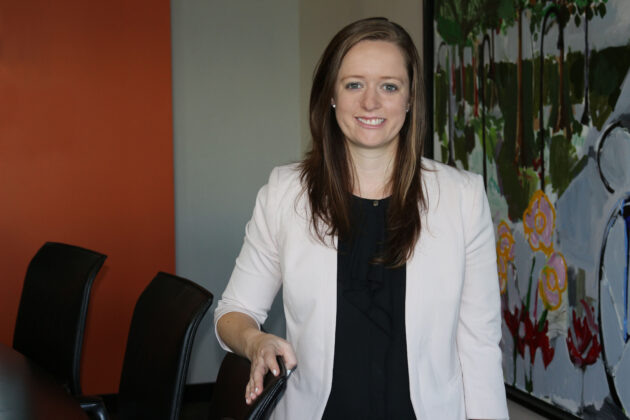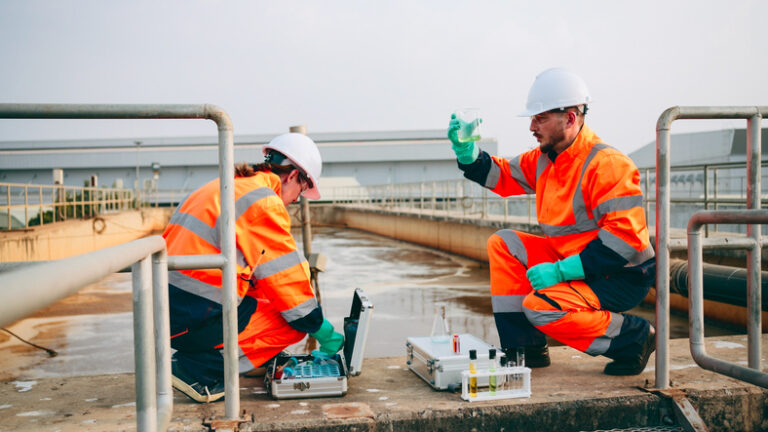The scarcity of women in the environment sector and working in science, technology, engineering, and math (STEM) positions is an ongoing concern. And the challenges brought on by the unprecedented COVID-19 pandemic created even more roadblocks for many of us.
According to a survey from Environment and Climate Change Canada, just 25 per cent of Canadian environmental professionals are women. In terms of construction related jobs, women make up only 13 per cent of environmental professionals. Another report indicates that women currently account for only 17.9 per cent of newly licensed engineers, and 14 per cent of engineers overall in Canada.
For years there has been an active drive to increase participation as well as encourage leadership roles in the environment sector, whether that be in engineering, business, or other capacities. But the numbers remain low across the board.
Leading academic institutions such as Polytechnique Montréal are aiming to bump up the number of female engineering graduates to at least 30 per cent. This percentage is universally held to be the tipping point for sustainable change.
“We believe it’s essential for women to take their rightful place in engineering to contribute to the development and deployment of sustainable solutions to meet the challenges of our time,” said Philippe Tanguy, president of Polytechnique Montréal. “If a lack of female role models can explain this representation gap, the growing number of women graduates will help attract more young women to this career path.”
There’s also a persistent lack of representation in executive and leadership roles across the sector—despite a growing amount of data showing that bringing more women into the upper echelons of an organization can help improve the bottom line by the billions.
According to a study by S&P Global Market Intelligence, firms which appoint women into CEO and CFO positions are outperforming relative to their male counterparts—and are boosting their firms’ financial performance. Female CEOs saw a 20 per cent increase in stock price momentum and female CFOs saw a six per cent increase in profitability and eight per cent larger stock returns. Furthermore, firms with a high gender diversity on their board of directors were more profitable and larger than firms with low gender diversity. These firms also demonstrated a stronger culture of diversity and inclusion.
Meanwhile, the challenges of the pandemic have intensified the obstacles of women in every industry. Suddenly, the home-work life of many collided in a 24-7 juggling act. Many mothers (and fathers) were expected to pivot and overcome pandemic work challenges while supporting kids in remote schooling.
However, the pandemic also provided time to pause and push for progressive solutions. Such was the perfect storm that prompted the Ontario Environment Industry Association (ONEIA) and members such as Bobbie Thoman, a Carbon Strategist with Walker Industries to plan ONEIA’s inaugural “Future of Work: Women in the Environment and Cleantech” event.

“I wanted to be involved in something that united us and paves a pathway forward,” said Thoman, who is based in Niagara Falls, Ontario. “I saw the opportunity to collaborate with other like-minded women in the sector at this critical time. The pandemic brings an additional set of struggles.”
In her role with Walker Industries, Thoman identifies opportunities to recover resources, reduce waste, and decrease greenhouse gas emissions. She has a knack for leveraging private capital to help reduce emissions and drive change. And she harnessed her talents for this event planning process.
The virtual event provided a platform to interact about the issues women in the environment sector are facing. The slate of seasoned speakers dove into the issues, and hold back from talking about the real and relatable challenges involved in balancing work and family life. They shared a wide range of work experiences from various areas of the sector—including climate, water, waste, and energy—with over 100 attendees eager to learn how to attract, retain, and maximize women’s talent in the sector.
A highlight of the event was the keynote session featuring Cynthia Leung, founder and CEO of Soluminos, and Laura Zizzo, founder and CEO of Manifest Climate.

Leung is a Clinton Global University Initiative Commitment Maker, a master’s candidate in Columbia University’s Sustainability Management Program, and a two-time Earth Institute Sustainability Fellow. She was recently awarded with the Columbia School of Professional Studies 2020 Scholar Practitioner Award for her work focused on her social enterprise inside and outside of the classroom.
Prior to Columbia, Leung was a project development manager on the utility team at SunPower where she worked on developing over 1 gigawatt of solar projects. She was a professional mentor and coach for the TechWomen Program and is a certified mentor. She has hosted international training and presentations on sustainability, communication, and mentorship.
Zizzo is also an inspiring female leader. She is a trained lawyer, communicator, and entrepreneur with over 20 years of experience leading organizations towards a low-carbon and climate-adapted future. Through her work in climate change law, policy, and financial risk, she has become a respected advisor to leading financial institutions, as well as local and international governments. She is a strong voice on the legal imperative to adapt to climate change and the need to bring climate into the core of business considerations.
As a delegate to the United Nations Framework Convention on Climate Change (UNFCCC), Zizzo has been attending annual Conference of the Parties meetings since 2007. Her journey as a communicator about climate change began in 2008 when she participated in Al Gore’s Climate Reality Leadership Training program and learned to present the watershed film, “An Inconvenient Truth.” As a speaker on the low-carbon economy and implications for investors, she has addressed audiences representing over $1 trillion in assets under management.
Most recently, Leung has been focused on renting solar charging stations for remote charging applications in San Francisco, while Zizzo has been focused on launching a software platform to translate climate for business.
These are busy women but they both carved time out of their schedules to share their stories and words of wisdom. “It’s so important to seek out mentorship and to provide it,” said Leung. “Mentorship can help young women to find their voice.”
Overcoming obstacles
For both Leung and Zizzo there were bumps along the path to their successful careers in the environment sector. Interestingly, they both started out as shy children. Leung credits theatre arts for helping her come out of her shell while Zizzo says it was competitive dance that helped with her confidence.
As they became older, their obstacles became more challenging. Zizzo recalls starting her law firm and finding out she was pregnant with twins. “When you’re in those child-rearing years, you need a lot of support,” recalls Zizzo. “I needed help with the family stuff so I could keep dedicating my career to the climate crisis.”
Leung agrees that reliable support systems are critical. “We need society to be more aware of support systems and to encourage everyone to step up to help women to do what they need to do to persevere in their career goals.”
They’ve experienced the alienation of being one of the few women in the room at any given meeting or event. The lack of female representation and of diversity remains an ongoing challenge, but it’s one they are both eager to help overcome.

“Women need more champions,” emphasized Zizzo, “and we need to champion ourselves.”
“You need to step up. No one else can represent your views as well as you do,” added Leung. She also acknowledges “it can be scary to speak out.” Leung recommends starting small: speak to a couple of coworkers, then a small group, and sharpen your message before “jumping into the lion’s den.”
Zizzo shared her mantra that helps her to try something new: “Good enough for now, safe enough to try.” Is this idea good enough for now and safe enough to try? This is what she asks herself before she presses send or makes a bold move, such as starting her own law firm at the age of 27.
In order to help women enter the environment and cleantech sector, they need to be hired. This sounds simple enough with an increasing number of graduates. However, too many human resources departments are still seeking people with experience over other attributes.
“If we only hire people with experience then we’re going to miss out on diversity, which is just as important as experience,” remarked Leung. She urges young women starting out to “Remember that your voice is important. Even if you don’t have an abundance of experience, your fresh perspective is valuable.”
Leung encourages young women to step up and network with mangers and advocate for organizations to practice inclusion. She emphasizes the importance of noticing how often people are speaking up and how workplaces create space for people to come forward. She also recommends addressing different styles of communications. For example, providing opportunities for both introverts and extroverts to participate through various communication materials and mediums.
Succeeding in the sector
How do we effectively bump up the number of women involved in the environment sector and in the c-suite? These are some of the key take-ways from the event:
- Believe in yourself. While many women are confident in their abilities in the academic environment, the transition to the workplace and later stages of life bring different types of challenges. Stay focused on your goals and don’t get deterred by the lack of women in the room.
- Build a support system. In order to set yourself up for success, it’s important to have a sustainable work-life-family balance. Try to plan ahead and arrange support if need be so you can focus on your work. And try to arrange extra support, if possible, during a particularly challenging time, such as the pandemic.
- Mentors are important. Selecting the right mentors to help guide women on their career path is essential. They can help educate females early on the various pathways in the environmental sector and STEM, and in their capabilities and opportunities for leadership roles. Research how other women have accomplished their goals. The best mentors don’t throw you off the cliff, they give you good advice and encourage you to fly.
- Take strategic risks. Have confidence in your training and your experience, and have faith that there are others who appreciate what you bring to the table. If you’re unsure as to whether you can take a risk at a big meeting, it’s wise to strategize beforehand and ask some of your male and female mentors to help upsell and help champion your ideas and opinions.
- Encourage flexibility and diversity in the workplace. It’s time to challenge misconceptions about workplace arrangements and culture. Advocate for a flexible work environment that allows you to actualize your life goals and do your best work. Don’t forget to pay it forward and encourage your organization to engage, hire, and retain a diverse workforce.
It can be hard to tell in a digital world how well an event is received but Thoman reports that many women reached out to say they felt more empowered to support female colleagues in their career. Male attendees also reported they now understand the issues better. There are already plans for a follow-up event.
So, what does the future hold? How do we empower women to enter — and stay — in the environment sector? The future of women’s work in the green economy is looking more promising than ever but there is still much work to do in making it more equitable and sustainable for all.
A complete recording of the ONEIA Future of Work event is available below.
This article was written by Connie Vitello, the editor of EnvironmentJournal.ca.









